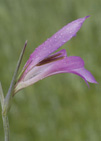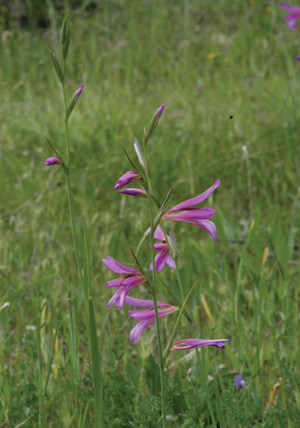

Rose of Sharon, Gladiolus italicus, in May, on Mount Lebanon at 1000 meters (3281 feet) near the town of Mukhtara.
FEW BIBLE PLANTS ARE BETTER known than the rose of Sharon: “I am a rose of Sharon, a lily of the valleys” (Song of Solomon 2:1, NIV). More accurately, the name of the plant is well known, but the precise identity is uncertain and it is not a rose (genus Rosa). The only clue to what is obviously a strongly figurative image is the ecology—the plant is linked with the Plain of Sharon. Sharon is the fertile coastal plain, 60 kilometers (50 miles) long and about 17 kilometers (10 miles) wide that parallels the Mediterranean in the northern half of Israel. The plant associated with this area of intensive agriculture is likely adapted to cultivated fields, not other habitats such as forests or marshes. The “rose of Sharon” must therefore be able to tolerate shallow cultivation, which would have been the norm in Bible days with draught animals and plowing. Several plants can be considered. In addition to Rosa species, tulip (Tulipa species) and daffodil (Narcissus species) have been suggested as “rose of Sharon.”
Assuming that the weed flora of modern grain fields (in traditional cultivation, not in large-scale mechanized cultivation) is similar to that of Bible times, I believe that Gladiolus italicus and the closely related if not conspecific G. atroviolaceus could be the rose of Sharon. I have seen them in fields maintained traditionally, small plots in Palestine, Lebanon, and Syria, planted with grains or legumes and cultivated either by hand or with animal power. They thrive under these conditions because they flower at the end of the rainy season before the crop is harvested and the field is left fallow until plowing in the early fall. The plants are probably spread by asexual reproduction from the corm by the disturbance of cultivation. These relatives of the common garden gladiolus resemble their cultivated cousins, with distinct pointed leaves and large, showy flowers.

Rose of Sharon, Gladiolus italicus, a relative of the garden gladiolus, graces fields that are so shallowly plowed the rootstock is not destroyed.
Rose of Sharon, like the balm of Gilead, is embedded in church language and culture. The fact that neither of these two notables can be identified with precision does not diminish their lore.